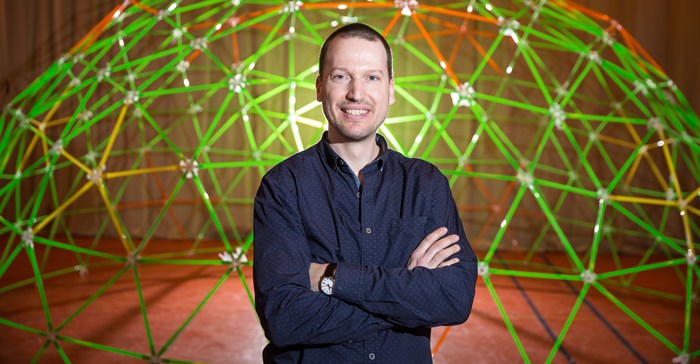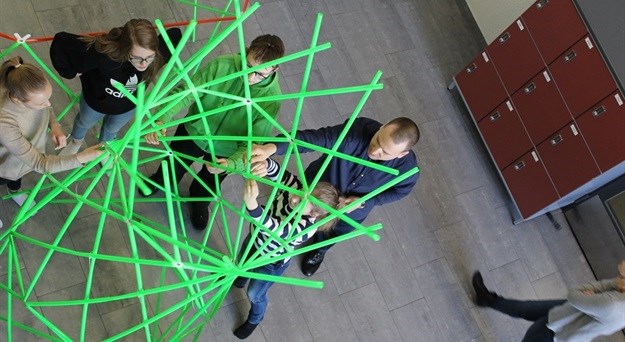






One of the speakers that will be featured at the event is Kristóf Fenyvesi, an education researcher at the University of Jyväskylä, Finland and vice-president of the world’s largest maths and arts community, the Bridges Organisation. According to Fenyvesi his research focuses on finding connections between maths, arts and design in education. “I try to support teachers of mathematics, arts and design to work together with teachers of other subjects and to involve their students in the process of selecting the topic and designing their learning process,” he says.
Below Fenyvesi elaborates on why the integration of art and design to traditional Stem subjects (maths, science and technology) is so important. He also shares why South African youth can benefit from the symposium and his vision for the future of 'Steam education'.
 Please tell us how you became involved with the Open Design Cape Town Festival's Steam Symposium.
Please tell us how you became involved with the Open Design Cape Town Festival's Steam Symposium.We do a lot of workshops all around the world and when we met at a conference with Dr Celia Booyse, a prominent curriculum researcher from South Africa, she connected us with Open Design Cape Town Festival's programme director, Suné Stassen. As I know from our discussions with Stassen and Booyse, and also learned from my recent visit to Nelson Mandela University, South African society and education is on the one hand facing big challenges, but on the other hand, holding huge, still unexplored potential.

Many disadvantages can be turned into advantages by developing integrative awareness and restablishing learning on creative and collaborative problem-solving, which has the capacity to engage students to actively embrace each other's culture, especially through art and design, as part of their own personal learning process. We have decided to give the floor to these ideas at this year's Festival, by promoting Open Design's impact on science, technology, engineering, arts and mathematics Steam education. Together with my Steam-expert colleague, Ho Gul Park from Seoul, Korea, where Steam education is one of the most successful among the innovative learning practices, we are very glad to come to Cape Town and contribute to the festival and to the current educational discussions in South Africa.
 Steam adds the creativity and vision of art and design thinking to the traditional Stem (Science, Technology, Engineering, Math) subjects. Why is this integration necessary?
Steam adds the creativity and vision of art and design thinking to the traditional Stem (Science, Technology, Engineering, Math) subjects. Why is this integration necessary?There is a growing gap between the increasingly technological, networked social systems and the people, who have real access to the opportunities provided by these. Getting more access through learning and diminishing the gap is not mainly about becoming able to enjoy more benefits provided by civilisation, but rather to gain individual and social capability and confidence to develop and radically change cultural practices. Real learning is shaping culture by sharing tools and related knowledge. Learning art and design that goes hand-in-hand with sciences can recognise the personal, social and cultural potentials of your studies, to maintain the link between information and imagination. It encourages self-expression, develops criticism and makes you prepared to break new paths, and to experiment by taking higher risks. Currently, we are living in a result-oriented world, although a big part of our results has contributed to our problems. It would be better to watch the process. Restablishing Stem integration on the arts and design can also help us to rediscover the hidden values in the process-aspect of learning and living.
 Please tell us more about the Experience Workshop that you founded.
Please tell us more about the Experience Workshop that you founded.
About 10 years ago, we have started the Experience Workshop international mathematics and art movement with my colleagues from all over the globe to break down traditional subject silos. Our goal is to support students and teachers in exploring the complexity of real life problems from several different perspectives as part of collaborative problem-solving activities.
 Any future plans in the pipeline for these workshops?
Any future plans in the pipeline for these workshops?
We have just returned from Canada, where Experience Workshop has coordinated Bridges 2017 conference's public day and our colleagues gave several workshops, exhibited artworks and presented various papers. Within some weeks after the Open Design Festival in Cape Town, we are contributing to the Ars Electronica Festival in Austria, then to the Helsinki Design Week in Finland, and in October we will support an international mathematics and creativity challenge for children and youth in Korea. Meanwhile we will also have a lot of smaller events in Central and Northern Europe. In addition to these events, our main goal is now to develop the implementation of our experiences in teacher education, professional development and research.
Steam is currently a useful acronym to easily summarise and to 'brand' our complex goals related to cross-, multi- and transdisciplinary learning. But just like Stem, it is rather an economic policy and not a methodology. It might be a tool for politicians to invest into something good, but only until teachers and students can guarantee that the critical potentials in art and design won't get corrupted. How do you think South African youth, in particular, can benefit from the Steam Symposium?
How do you think South African youth, in particular, can benefit from the Steam Symposium?
I hope that the process of learning by doing, the playful character of our activities, the engaged and motivated atmosphere of collaborative problem-solving will be a cozy, empowering and important experience for the participants of our workshops. I trust that everyone will find something, either in the content or in the social experience, what will be worth to remember. I also hope that our collaborations with South African colleagues in the open design movement, at Umalusi, at Nelson Mandela University and other institutions will have a small part in the transformative development of the South African education culture. What is your vision for the future of Steam education?
What is your vision for the future of Steam education?
 What inspires you?
What inspires you?
To see my children happy and becoming smarter than me.
Want to know more? Connect with Kristóf Fenyvesi on the following platforms: Website | Facebook | Twitter.
